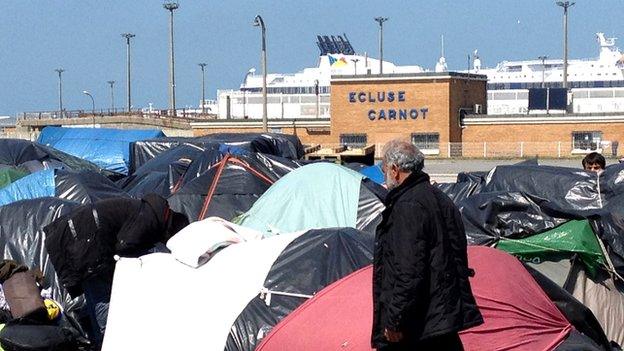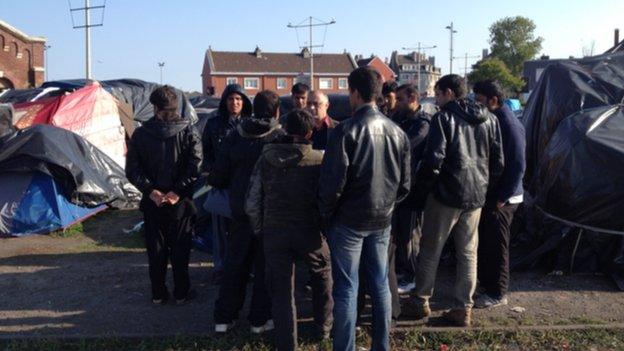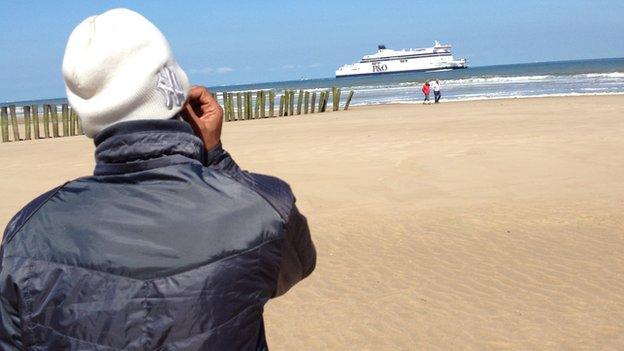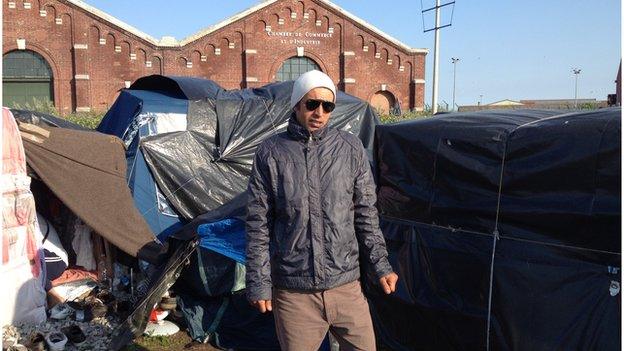Afghan Notebook: From Kabul to Calais
- Published

An informal tent camp in full view of Calais harbour
About 200 Afghans are among almost 1,000 migrants living in squalid conditions in the French port city of Calais, just across the English Channel from Britain. BBC Afghan's Bashir Bakhtyar met several of them when he went to report on their informal camps.
Among them was the man who grabbed the headlines this month when he set sail on an improvised raft to try to get to the UK, only to be picked up by a French lifeboat.
Home for the Calais Afghans is a filthy camp of plastic bags and sheets on a disused railway line, without water, power or even enough food.
Their illegal settlement lies just a few hundred metres from where the big ferries take hundreds of passengers back and forth between France and the UK.
It's a desperate and frustrated group, subsisting on one meal a day, mainly pasta, provided by a local aid group.
Every night they sneak out of their tents for what they call "the throw", a desperate attempt to climb on board one of the many trucks destined for Britain.
Some of the men I met had Italian temporary residence permits.

The Afghan migrants come from all parts of the country but share one goal - making it to the UK
But still they were keen to come to Britain because they believed it was easy to find a job there.
They told me that there was not enough work in Italy, and since their travel documents did not allow them to travel legally to the UK, they were opting for illegal ways.
One man who epitomises the migrants' determination is Asif, the 33-year-old Afghan who shot to fame of sorts when he tried to cross the Channel on a self-made raft.
Frustrated by his continued failure to sneak into Britain by boarding trucks, he made his raft using discarded bits of wood and plastic he picked up in the streets of Calais, using an old bedsheet for a sail.
Asif took me across the dunes down to the beach where he set sail at dawn on a day in early May.
He said he thought it was the point closest to Britain.

Asif looking out over the Channel from the spot where he tried to set sail
"Water is as soft as cotton," he told me looking out over the Channel on a sunny day with ferries gliding past. "It's not as dangerous as boarding the moving trucks."
He said that his craft had made good progress into what he called the dark waters, when the wind changed and pushed him back towards the shore. The lifeboat fished him out a little later.
Inside his tiny makeshift tent, Asif told me about his dream of reaching London, which he describes as the "star of Europe".
He's been chasing that dream for over a decade.
A farmer's son from the Mosahi region, just south of Kabul, Asif left Afghanistan during the last years of Taliban rule in search of a better life,
By his own account, his largely illegal voyage took him to Iran, Turkey, Greece, Serbia, Croatia, Slovenia, Italy and Switzerland.
He says that in almost every country he stayed for about a year to save money for the next leg of his journey.
His story, the many obstacles as well as the stubborn desire to reach the UK, is typical among the men here.

Asif left Afghanistan 14 years ago, travelling through eight countries to reach Calais
But many get stuck in this small city and their presence is very visible and has made some locals angry, something I experienced first hand.
As Asif and I made our way to the beach, there were openly hostile looks and one man made a cut-throat gesture towards us.
Such sentiments are understandable, considering that the port has been the gateway for Afghans and other migrants attempting to reach Britain for years.
Inside a garage, local staff did not hide their frustration, citing concerns over the city's image.
One of the workers told me she could not see a solution:
"It looks like a never-ending process. The more you take in, the more tend to come," she said.
It's an observation born out by the determination of the men I met to try and try again.
Asif was not deterred by his aborted crossing. He had no regrets, he told me, and would be making another attempt. When and how he kept to himself.